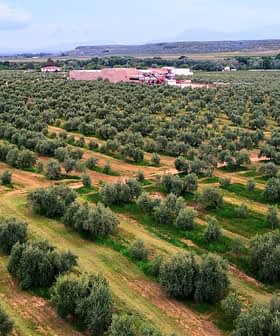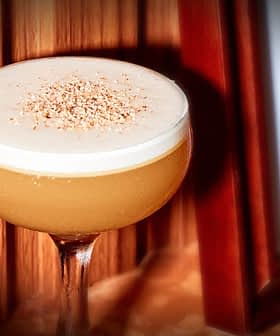Olive Oil Overtakes Wine as Popular Host Gift in Britain
It has become chic in the U.K. to present dinner party hosts with a bottle of extra virgin olive oil instead of wine or chocolates.
 AI-generated image
AI-generated image A new tradition involving bringing olive oil as a gift to dinner parties has gained popularity in Britain, with the Waitrose Food & Drink report highlighting it as a trendy alternative to wine. The trend is attributed to the exclusivity and health benefits of olive oil, which can last longer and be used in various food preparations compared to wine, although some etiquette experts question whether it may offend hosts.
Brits are renowned for their love of etiquette, establishing rules and customs that shape daily life. A new tradition has emerged, placing olive oil at the center of the custom of bringing a gift to a dinner party.
See Also:Croatian Tech Company Produces Award-Winning extra virgin olive oil for GiftingThe new gifting code gained momentum after a report from Waitrose, a British supermarket chain, placed olive oil among the upmarket foods that can be brought to dinner parties instead of the customary wine.
The 2024/25 Waitrose Food & Drink report cited a British House and Garden magazine consumer survey. It found that guests are more likely nowadays to arrive at parties with a bottle of extra virgin olive oil under their arm instead of wine.
Apart from olive oil, the Waitrose report highlighted table olives, nuts, honey, artisan vinegar and rare salt as food products that can replace a bottle of wine or a box of chocolates as gifts at dinner parties.
“Gifting a bottle of quality extra virgin olive oil is a brilliant alternative to wine and makes for the perfect present to bring to a dinner party,” Sarah Vachon, the founder of Citizens of Soil, a British company that sells extra virgin olive oil in reusable bottles and pouches from small-scale female producers, told Olive Oil Times.
Having worked in the food and drinks industry for over a decade, Vachon and her business partner championed the new trend by bringing people a bottle of olive oil instead of wine early in their olive oil journey.
“The reaction was overwhelmingly positive, and soon our whole ‘cheat on wine — bring a better bottle’ campaign was formed,” Vachon said.
The paradox of extra virgin olive oil in the U.K. is that record-high prices, which rose by 42 percent in the country over a year to reach around £7.40 (€8.88) per liter, have put extra virgin olive oil in the category of luxury foods and have contributed to the highest-quality olive oil grade becoming particularly sought after and popular as a dinner gift.
“And now that the product is so expensive, consumers are demanding more from it,” House and Garden wrote. “Much like wine, people want to know what ingredients have gone into it, where the olives were grown and who’s behind the brand.”
Vachon attributed the growing popularity of the new gift-giving etiquette to the status and inclusiveness a bottle of extra virgin olive oil carries.
“Status from the stance of showing off a more unique, thoughtful present than the cliché bottle of wine, and inclusive because you’d be hard-pressed to find a diet or lifestyle that can’t enjoy extra virgin olive oil,” she said.
Besides the healthy attributes, bringing extra virgin olive oil to parties also has hidden benefits; compared to a bottle of wine, which might be gone by the end of the night, olive oil can last for a few months and be used in several food preparations.
“With changing diets and lifestyles, alcohol doesn’t always suit everyone, but olive oil is a universally inclusive option,” Vachon said. “It is indulgent yet healthy, lasts longer than a single evening, and enhances the meal in a similar way – all while carrying its own unique story of provenance.”
“Just like wine, a well-crafted olive oil reflects its terroir and maker, thereby being a thoughtful and distinctive gift that can be enjoyed by everyone, whether drizzled over any meal for flavor, used for its dynamic nutritional benefits or simply dropped in to enhance a martini,” she added.
However, Britain’s most popular etiquette guide, Debrett’s, questioned the new trend of bringing olive oil to dinner parties, arguing that it could offend hosts.
“Good-quality olive oil is becoming desirable, so I can see why some people might think it’s a good gift idea, but it does trouble me because it might imply that your host does not have a sufficiently well-resourced kitchen,” Liz Wyse, an editor at the 250-year-old firm, told The Times.
Wyse noted that an exception could be made for a bottle of extra virgin olive oil brought back to Britain from a Mediterranean producer.
“I could imagine a situation where maybe you have been on holiday and bought a wonderful bottle of extra virgin olive oil from some Italian farm you have visited,” she said. “That would be a different situation and an acceptable gift.”
On the other hand, Vachon postulated that if the reputation of dinner party hosts for upscale food were tainted by the guests’ gifts, wine and olive oil would have a similar effect.
“In the U.K., depending on the party, more traditional tables might still expect or even prefer wine,” she said.
“However, I can’t imagine someone being insulted that you selected a thoughtful olive oil to bring them, particularly if you find something that’s a bit more artisan,” Vachon added. “It can’t be any worse than bringing a decent bottle of wine to someone’s house expecting they won’t have the good stuff in that department either.”
Food historian Pen Vogler said that 2,000 years ago, Romano-Brits adored olive oil. After the Romans left Britain in the 4th century, olive oil remained in use on the island for various purposes, including medical applications like curing headaches, eating on days of fasting when pork fat and butter were off-limits and used as a ‘salad oil.’
According to Vogler, some eminent authors and writers also boosted the use of olive oil in the U.K. over the centuries.
In the 1840s, home-cook author Eliza Acton advised her readers to deep-fry fish in olive oil, which led to today’s iconic British dish of fish and chips.
In the 1950s, writer Elizabeth David, who revitalized home cookery in Britain with her books on European cuisines and British dishes, nudged Britons into using more olive oil by saying that “a supply of good olive oil is essential.”
“By 2004, olive oil outsold all other cooking oils in Britain,” Vogler noted. “Every aspiring restaurant kitchen became awash with it too.”
“No matter what the etiquette experts say, a bottle of the precious liquid is a lovely present,” she added. “It is even more magical when it comes from the estate of someone you know.”
Share this article









